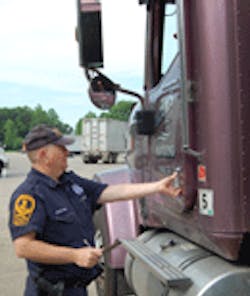With the Commercial Vehicle Safety Alliance (CVSA) set to activate its annual Roadcheck event next week, from June 8-10, there is some concern as to whether the positive safety trends this effort has revealed in recent years will continue on given the impact of the economic recession and continuing fiscal pressures on trucking companies.
“We are definitely hopeful the trends we’ve seen in recent years continue in the right direction,” Steve Keppler, CVSA interim executive director, told FleetOwner. “Last year’s event posted some good numbers and we’ve also seen good trends in terms of declining [truck-involved] crash statistics. But realistically, it’s too soon to tell. The economy is only just now reviving, with freight and freight rates just starting to climb.”
Roadcheck is a 72-hour safety inspection blitz held across the U.S. and Canada that mobilizes thousands of federal, state, provincial and local inspectors at more than 1,500 locations across the continent to conduct comprehensive North American Standard (NAS) Level I Inspections and other related roadside enforcement activities.
Last year, 9,683 CVSA and Federal Motor Carrier Safety Administration (FMCSA) certified inspectors at 2,145 locations across North America performed a record 72,255 truck and bus inspections. The overall vehicle compliance rate for 2009 – 80.4% – was the best Roadcheck result recorded since 1996, with the overall driver compliance rate – 95.7% – the highest ever.
For NAS Level I inspections, the compliance rates of 77.8% (vehicles) and 96.1% (drivers) were both records for Roadcheck, and represented 7.1% and 20.4% improvements, respectively, over 2008's totals. In addition, safety belt violations were reduced in 2009 by 276 (1,246 to 970), a 22.2% improvement over 2008, CVSA reported.
CVSA’s Keppler believes those numbers demonstrate that a significant shift is occurring in how the trucking community views safety.
“A new ‘mindset’ is taking hold that firmly links safety and profitability – and it’s not just within trucking, either,” he said. “More carriers are finally getting ‘air time’ for the good things they do in terms of safety, such as Schneider National’s driver fatigue management plan. More shippers are paying attention to such safety efforts and are choosing carriers that promote them. That’s a really good thing.”
About the Author
Sean Kilcarr
Editor in Chief
Sean Kilcarr is a former longtime FleetOwner senior editor who wrote for the publication from 2000 to 2018. He served as editor-in-chief from 2017 to 2018.
